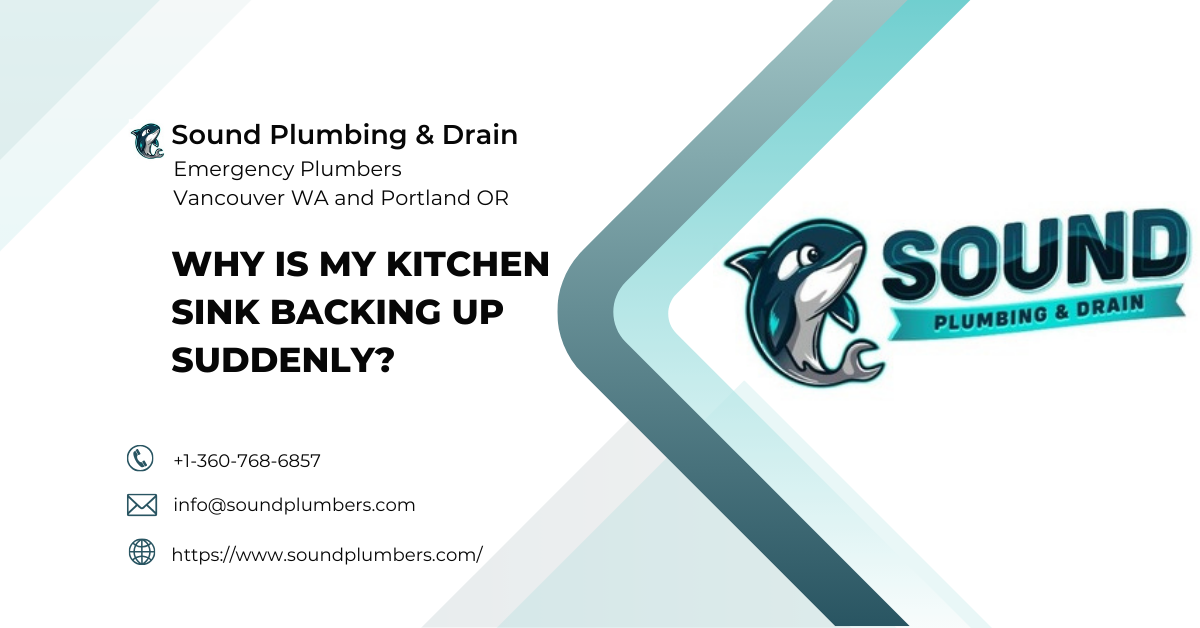What Are The Common Causes of Kitchen Sink Back Ups?
A sudden kitchen sink backup can be frustrating, leaving you with standing water and no idea why it’s happening. The most common causes include grease, food scraps, or even soap residue building up in the drain. Sometimes, foreign objects or a clogged P-trap could be to blame. In this guide, we’ll walk you through why this happens, how to fix it, and what you can do to prevent it from happening again. Whether it’s a quick DIY solution or knowing when to call a plumber, you’ll find answers to get your sink back in working order.
Here's What We Have Covered In This Article
2. How Can You Tell Your Sink Is Backing Up?
Spotting the signs of a backup early can save you a lot of hassle. Have you noticed water draining slower than usual? This could mean a clog is starting to form. A gurgling sound when water drains is another telltale sign, as it often indicates trapped air in the pipes. If you’re greeted by unpleasant odours wafting up from the sink, food particles or grease might be decomposing in the drain.
Pooling water is a clear sign, but even small puddles around the base of your sink or under the cabinets could signal an issue. Ignoring these warnings could lead to more serious plumbing problems down the line.
Experts from Southern Living explain that slow-draining water, gurgling noises, and foul odours are common signs of a backed-up sink caused by food particles decomposing in the pipes.
Source: https://www.southernliving.com/how-to-clean-your-kitchen-sink-drain-8759514
Fast Plumbing Repairs in Your Neighborhood
Serving homes and businesses across Clark County, Vancouver, Portland Metro Area, and surrounding areas, our expert plumbers are ready to handle any issue. Contact us for fast, dependable service today!
3. What Quick Fixes Can You Try?
If your sink has already backed up, don’t panic. There are a few quick and easy solutions you can try before calling in a plumber. Start with a plunger – it’s a simple tool that can clear minor clogs by creating suction and loosening the blockage. Make sure to block the overflow hole with a wet cloth to get the best results.
Another effective trick is pouring boiling water down the drain. This can break up grease or soap residue. For a more natural solution, mix equal parts baking soda and vinegar. Pour the mixture down the drain, cover it with a plug, and wait for 15 minutes before flushing with hot water. A drain snake is handy for pulling out stubborn clogs caused by hair or debris.
4. Why Should You Call a Plumber?
Sometimes, the problem isn’t something you can fix on your own. If your sink remains backed up after trying DIY solutions, it’s time to call in a professional. Persistent blockages could be due to deeper issues like damaged pipes or tree roots infiltrating the plumbing system. A plumber has the expertise and tools, such as hydro jetting and pipe cameras, to diagnose and resolve these problems quickly.
Delaying professional help could lead to water damage, higher repair costs, or even complete pipe replacement. If water starts leaking under the sink or the backup affects other drains in your home, don’t wait call a plumber right away.
Checkatrade advises that if DIY solutions fail, professional tools like hydro jetting or pipe cameras may be necessary to address persistent blockages or underlying issues in the plumbing system.
Source: https://www.checkatrade.com/blog/expert-advice/common-causes-blocked-drains
Plumbing Upgrades for Homes and Businesses
From water heaters to trenchless solutions, we serve communities like Hazel Dell, Salmon Creek, Vancouver, and Portland. Upgrade your system with our expert team—get a free quote now!
5. How Can You Prevent Sink Backups in the Future?
Preventing backups is often easier (and cheaper) than fixing them. Avoid pouring grease, oil, or coffee grounds down the drain, as these can harden and create clogs. Instead, dispose of them in the bin. Install a drain screen to catch food scraps and other debris before they enter the pipes.
Regularly flush your sink with boiling water to keep residue from building up. If you use a garbage disposal, run cold water while it’s in use to help break down food particles effectively. Simple habits like these can go a long way in keeping your sink trouble-free.
Regular maintenance practices, such as flushing your sink with boiling water and avoiding grease disposal, are highly effective at preventing clogs, according to Better Homes & Gardens.
Source: https://www.bhg.com/homekeeping/house-cleaning/tips/how-to-clean-your-kitchen-sink/
6. Are Sink Backups Harmful to Your Home?
While a blocked sink may seem like a small inconvenience, it can lead to bigger issues if left untreated. Standing water is a breeding ground for bacteria, which could cause unpleasant odours and potentially harm your health. Over time, the extra pressure on your pipes can cause leaks or even bursts, leading to water damage in your cabinets or floors.
Ignoring backups could also affect your plumbing system as a whole, leading to more frequent issues in other parts of your home. Acting quickly is the best way to protect your home and your wallet.
The EPA warns that standing water caused by blockages not only puts pressure on your pipes but also creates a breeding ground for bacteria, posing health risks.
Source: https://www.epa.gov/npdes/fats-oils-and-grease-aka-fog
Keep Your Plumbing in Top Shape with Expert Maintenance
Our maintenance services cover areas within a 25-mile radius of Hazel Dell, including Vancouver, Battle Ground, and Portland. Schedule a visit today and prevent costly breakdowns.
7. What Are the Key Takeaways for Dealing with Sink Backups?
The best way to deal with a backed-up sink is to act fast and identify the cause. Simple solutions like plunging, using hot water, or a natural mixture of baking soda and vinegar often work wonders for minor clogs. However, if the problem persists or you’re facing recurring backups, it’s wise to seek professional help to address the root of the issue.
By taking preventative steps like avoiding grease disposal, using drain screens, and maintaining your sink regularly, you can keep your kitchen sink flowing freely and avoid future headaches.
The Nature of Home emphasises that small habits, like using drain screens and properly disposing of grease, can prevent costly and recurring plumbing issues.
Source: https://thenatureofhome.com/things-never-put-down-your-kitchen-drain/





